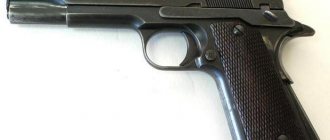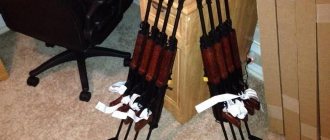ST 175 of the Criminal Code of the Russian Federation.
1. Purchase or sale of property known to have been obtained by criminal means not promised in advance is punishable by a fine in the amount of up to forty thousand rubles or in the amount of the wages or other income of the convicted person for a period of up to three months, or by compulsory labor for a term of up to four hundred eighty hours, or correctional labor for a term of up to two years, or forced labor for a term of up to two years, or imprisonment for the same term.
2. The same acts committed: a) by a group of persons by prior conspiracy; b) in relation to oil and its products, a car or other property on a large scale, - c) has become invalid, - shall be punishable by restriction of freedom for a term of up to three years, or by forced labor for a term of up to five years, or by arrest for a term of up to six months. , or imprisonment for a term of up to five years with a fine of up to eighty thousand rubles or in the amount of wages or other income of the convicted person for a period of up to six months.
3. Acts provided for in parts one or two of this article, committed by an organized group or person using their official position, are punishable by forced labor for a term of up to five years, with or without restriction of freedom for a term of up to two years, or by imprisonment for a term of up to seven years. years with a fine in the amount of up to eighty thousand rubles or in the amount of the wages or other income of the convicted person for a period of up to six months and with or without restriction of freedom for a term of up to two years.
Commentary to Art. 175 of the Criminal Code
1. The subject of the crime is property known to be obtained by criminal means. The exceptions are: precious metals and natural precious stones, weapons, ammunition, explosive devices, explosives, nuclear materials or radioactive substances, drugs and other items withdrawn from free civilian circulation. The acquisition or sale of such items form signs of independent crimes qualified under Art. 191, 220, 222, 228, 228.1, 234, 242 of the Criminal Code, respectively.
2. The objective side is expressed in the previously not promised acquisition or sale of property obtained by criminal means. If these actions were promised to a person who directly obtained property through a crime, before or during the commission of a crime or in another way (by systematically acquiring from this person property known to be obtained by criminal means), then such an act is qualified as aiding and abetting the crime that resulted in the crime. property.
The article in question does not provide for liability for non-promised storage of property known to have been obtained by criminal means. However, liability for this crime may still accrue to a member of an organized group, including one engaged in the acquisition or sale of property known to have been obtained by criminal means.
3. The acquisition or sale of property known to have been obtained by criminal means is qualified under Art. 174, and not under Art. 175 of the Criminal Code, if the intent of the perpetrator was aimed at giving legal appearance to funds or other property known to be acquired by criminal means.
Article for buying stolen goods
If an individual became the buyer of stolen property and was well aware of this, then he faces liability under article number 175 of the Criminal Code of the Russian Federation. In addition, this legislative act is relevant for situations in which the sale of stolen property was carried out.
In other words, if one individual is the thief of something, and a completely different person is involved in its sale, then the latter will also face criminal liability. However, if the individual who carried out such manipulation did not know that this or that thing was obtained illegally, then he is exempt from liability.
If you have any suspicions that the item is stolen (for example, the price is too low and the seller does not appear trustworthy), do not buy it under any circumstances.
What types of punishments are there?
If it has been proven that an individual purchased a stolen item or sold it, then a fine will be imposed on him. The maximum amount of deduction can be forty thousand rubles. In some situations, the convicted person is deducted his wages for three months.
For example, this happens when an individual is unable to make a fine payment at one time. It also happens that the main type of income is not wages. In such situations, it is this main type of profit that is retained. In addition, the judge may decide that the offender must perform compulsory work. You will need to work about 480 hours.
Corrective labor is also used to punish convicts. The period of validity of this sanction is no more than two years. During the same period of time, the guilty individual may be forced to perform forced labor. In addition, it is also possible to apply sanctions such as imprisonment. The duration of this punishment is also two years.
The legislative act regulates only the maximum amount of the fine and the maximum period of validity of all other penalties. The judge decides what specific amount the convicted person will need to pay or how long he must serve a certain sentence. The verdict is made based on the circumstances of the crime, as well as the consequences that arose after its commission.
Buying and selling stolen goods in different ways
Property that was originally obtained through ill-gotten means can be sold or purchased in a variety of ways. If this offense was committed in a non-standard way, then the second paragraph of the legislative act, numbered 175, comes into force.
The second part of the article regulates penalties for buying stolen goods not by one individual, but by several people who were in conspiracy. This also includes situations of acquisition (or sale) of oil originally obtained by ill-gotten means, as well as products obtained as a result of its processing. It should be noted that the size must be large.
If convicted under the second paragraph of article number 175, the offending individual faces forced labor, the maximum period of which is five years. Also, restrictions on the violator’s freedom may be imposed for a period of no more than three years. In addition, arrest is possible. This sanction can be valid for a maximum of six months.
The legislative act also approved this type of punishment as imprisonment. It will take an individual five years to say goodbye to his freedom. In addition, a deduction of a monetary fine may be approved as a plus to this punishment. The maximum amount of this amount cannot exceed eighty thousand rubles. Instead of a fine, wages or other basic income may be withheld for six months.
What are the most severe penalties for?
The third paragraph of Article 175 of the Criminal Code of the Russian Federation for the purchase of stolen goods is devoted to the most serious offenses, for which the most severe forms of punishment are provided. This part of the article states that an individual will face the highest penalty if he was involved in purchasing stolen property under the following circumstances:
- As part of an organized group. From a legal point of view, an organized group is considered to be several individuals who have joined forces to commit a specific crime. Particularly experienced criminal groups carry out their plans many times. If an individual was engaged in purchasing stolen property not alone, but as part of a group of this kind, then he will face the highest penalty.
- With the help of official position. In some cases, an individual understands that by abusing his official position he will be able to gain personal benefit, and decides to take an action of this kind. In this case, we are talking about buying or selling stolen items. Often bosses are aware that the property was obtained illegally and therefore try to sell it as quickly as possible in order to earn money. Such actions should not go unpunished and require the most severe sanctions.
Violators of the third paragraph of the same Article 175 will face forced labor. The period of such punishment is five years. In addition to forced labor, a sanction such as restriction of freedom (for two years) may be used. However, this additional penalty is not mandatory. The convicted person may also face imprisonment.
In addition, the individual will need to pay a penalty. The maximum amount of deduction is eighty thousand rubles. If the offender, due to low income, cannot pay the fine in one go, then as an alternative, wages will be deducted from him. This procedure will take place over six months. Also, in addition to paying a fine and imprisonment, they may be restricted in their freedom. This form of punishment is imposed for no more than two years and is not mandatory.
Second commentary to Art. 175 of the Criminal Code of the Russian Federation
1. The subject is property that is known to have been obtained by criminal means, i.e. as a result of crimes committed by others.
2. The objective side consists of the acquisition of the specified property and (or) its sale that was not promised in advance.
3. The acquisition is completed from the moment of receipt of the property, the sale - from the moment of its alienation.
4. The subjective side presupposes the presence of direct intent. In this case, the person must be aware that the property was obtained by criminal means.
5. The subject is a person who has reached the age of 16 years.
6. Qualifying characteristics are provided for in parts 2 and 3 of the article.
7. In contrast to the legalization (laundering) of funds or other property acquired by criminal means (Articles 174 and 174.1 of the Criminal Code), when acquiring or selling property known to be obtained by criminal means, the offender does not seek to give its origin a legal character, and the person himself did not participate in the commission of the primary crime (Article 174.1).
Liability in a criminal case of a pawnshop that bought stolen goods
When handing over things to a pawnshop, they do not care about the origin of the goods. And since the search for goods is carried out according to the description and photo provided by the injured party, she will quickly be able to distinguish her things from others. If goods are found in pawn shops, a police officer is obliged to seize them and draw up a report. Next, they conduct an examination and find out whether the goods correspond to what was stolen.
If it turns out that everything matches, the actions of the buyer will be qualified under Article 175.
Modern methods of legalizing property obtained by criminal means
In order to protect yourself in the future from such unpleasant encounters with servants of the law, you need to know what to pay close attention to when purchasing any item. Some of the most common ways to legalize stolen property:
- Interruption of the identification or serial number is especially common when selling illegal equipment and stolen cars;
- Changing the appearance - for example, if you repaint a car and change its license plates, it can be easily passed off as another by attaching documents corresponding to the new paint;
- Passing through a large number of “hands” - behind a large list of intermediate buyers, you can lose the main node with which this network began.
Legal regulation in the Russian Federation
Bringing to justice persons who allowed the sale and acquisition of stolen valuables is carried out within the framework of the articles of the Criminal Code of the Russian Federation. In particular, the corpus delicti and the list of applied sanctions are reflected in Art. 175 of the Criminal Code.
As is typical for this norm, the purchase of stolen goods will be considered completed from the moment a person receives use or possession of a stolen item in any way (regardless of the further purpose of its use).
You can familiarize yourself with the full list of property, as well as options for the illegal acquisition of material goods, in the contents of Article 158 of the Criminal Code of the Russian Federation.
Attention! The effect of Article 175 for the sale of stolen goods will not apply to cases where the object of acquisition/sale is narcotic drugs, weapons, jewelry, antiques and other objects, the circulation of which requires special permits. In this case, special norms of the Special Part of the Criminal Code will be applied to the attacker.
Preparing for trial
The prosecution had no doubts about M.’s guilt at all, so the case calmly went to court.
To be honest, I didn’t really count on M’s acquittal. I didn’t think that the local court would listen much to an unfamiliar lawyer from another city. But I saw the possibility of justification here and built my defense strictly on this basis.
I still had one “secret” weapon in reserve. At that time, I was seriously interested in the book by P. Sergeich (P.S. Porokhovshchikov) “The Art of Speech in Court” and, of course, put into practice the techniques he described. And, sometimes, quite successfully. Using the recommendations of this book, long before the start of the trial, I began to prepare my speech in the debate. He selected striking words, honed his arguments, and said it all out loud. It was well clear how the defendants and witnesses would behave at the trial. My performance was brought to automaticity.



